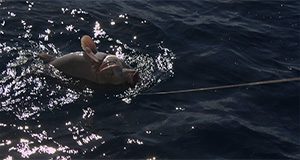If you catch a fish you are not going to keep, help it survive and get back to the deep! Throwing back your unwanted catch is good practice because healthy released fish can live to grow and reproduce, which benefits the fish population and the future of fisheries. But deepwater fish can have trouble getting back where they came from without a little assist from the angler. This 4-page fact sheet written by Betty Staugler, Holly Abeels, Angela Collins, Shelly Krueger, and Kai Lorenzen and published by the UF/IFAS Florida Sea Grant College Program describes barotrauma, a problem that, if left untreated, will kill otherwise perfectly healthy fish, and explains a few quick and simple methods to relieve fish suffering from barotrauma and help them get back home healthy and strong.
http://edis.ifas.ufl.edu/sg160
Tag: Betty Staugler
Awareness, Knowledge, and Perceptions of Barotrauma and Barotrauma Mitigation: A Survey of Florida Anglers
Saltwater recreational fishing is an important economic engine for Florida’s coastal communities. The annual economic impact to the Florida economy of saltwater recreational fishing, which sustains 110,000 jobs, is estimated to be $13 billion. Given the popularity and economic importance of reef fish, careful management of these fish stocks is imperative for the sustainability of the reef-fish resource. Barotrauma, a phenomenon that causes problems for deep-water fish caught and brought to the surface, is recognized by fishery managers as a key cause of death in “catch-and-release” reef fish. This 5-page fact sheet written by Charles Adams, Joy Hazell, Lisa Krimsky, Bryan Fluech, Betty Staugler, John Stevely, and Robert Botta and published by Food and Resource Economics Department describes a recent survey of Florida saltwater anglers and sheds light on incentives for and constraints against the use of barotrauma mitigation devices.
http://edis.ifas.ufl.edu/fe1010

